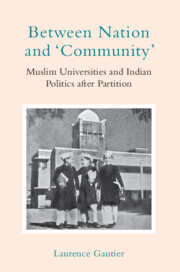Book contents
- Frontmatter
- Dedication
- Contents
- List of figures
- List of tables
- Acknowledgements
- A note on transliteration and translation
- List of abbreviations
- Introduction
- 1 A laboratory for composite India: Jamia Millia Islamia around the time of partition
- 2 Sifting Sir Syed’s legacy: From the ‘arsenal of Muslim India’ to a symbol of India’s national integration?
- 3 Re-legitimising minority rights: The campaign for Aligarh Muslim University’s minority status
- 4 Resisting minority politics, holding on to composite nationalism: Jamia Millia Islamia in the post-Nehruvian period
- 5 Uplifting backward Muslims: The new consensus?
- 6 Bastions of Islam: The defence of Islam as a narrative of empowerment and contestation
- 7 Women in Muslim universities: Guardians of tradition or actors of change?
- Conclusion
- Appendix
- Glossary
- Bibliography
- Index
1 - A laboratory for composite India: Jamia Millia Islamia around the time of partition
Published online by Cambridge University Press: 15 April 2024
- Frontmatter
- Dedication
- Contents
- List of figures
- List of tables
- Acknowledgements
- A note on transliteration and translation
- List of abbreviations
- Introduction
- 1 A laboratory for composite India: Jamia Millia Islamia around the time of partition
- 2 Sifting Sir Syed’s legacy: From the ‘arsenal of Muslim India’ to a symbol of India’s national integration?
- 3 Re-legitimising minority rights: The campaign for Aligarh Muslim University’s minority status
- 4 Resisting minority politics, holding on to composite nationalism: Jamia Millia Islamia in the post-Nehruvian period
- 5 Uplifting backward Muslims: The new consensus?
- 6 Bastions of Islam: The defence of Islam as a narrative of empowerment and contestation
- 7 Women in Muslim universities: Guardians of tradition or actors of change?
- Conclusion
- Appendix
- Glossary
- Bibliography
- Index
Summary
In November 1951, the Indian parliament decided, after long deliberations, to grant Aligarh Muslim University (AMU) the status of a central university. AMU thus became one of the first three central universities of independent India, directly benefiting from the central government's financial support.
Meanwhile, in Delhi's rural periphery, a small school, the Jamia Millia Islamia (JMI), continued to struggle for its survival. To those familiar with both institutions, this may appear to be a surprising paradox. Indeed, after partition, many regarded AMU as a ‘hotbed’ of ‘Muslim communalism’, especially after large numbers of students took part in the All-India Muslim League's campaign for Pakistan. Although university authorities quickly asserted their loyalty to the Indian state after independence, many outside the institution continued to see AMU as a symbol of Muslims’ so-called separatist tendencies.
By contrast, JMI appeared to be the ‘nationalist Muslim’ institution par excellence. Established in the wake of the Khilafat and Non-Cooperation movements, the ‘National Islamic University’ broke away from the loyalist attitude of MAO College. Its most prominent figures, Zakir Husain and Mohammad Mujeeb, shared strong personal and political connections with Indian National Congress leaders, particularly M. K. Gandhi. In the last decades of British rule, they remained firmly committed to the Congress’ one-nation policy, including at the time of partition. Why, then, did Jawaharlal Nehru's government neglect JMI after independence while it promoted AMU to the rank of a central university? What does this choice tell us about the government's attitude towards Muslim institutions and, more largely, towards India's Muslim citizens?
Mushirul Hasan has often emphasised the strong political and ideological affinities between JMI and the Congress. In his eyes, JMI epitomises the alliance between secular liberal Muslims and Congress leaders, particularly Gandhi and Nehru. By highlighting these connections, Hasan aims to prove that, far from endorsing the Muslim League's two-nation theory, a significant part of India's Muslim population continued to embrace the Congress’ secular nationalism, before and after partition. However, by focusing on the convergence of ideas between JMI members and Congress leaders, Hasan gives us little explanation for JMI's neglect after independence. Moreover, he tends to flatten out the differences between JMI and Congress leaders, as if these men all shared the same approach to secular nationalism, a point that we must question.
- Type
- Chapter
- Information
- Between Nation and ‘Community'Muslim Universities and Indian Politics after Partition, pp. 35 - 89Publisher: Cambridge University PressPrint publication year: 2025



